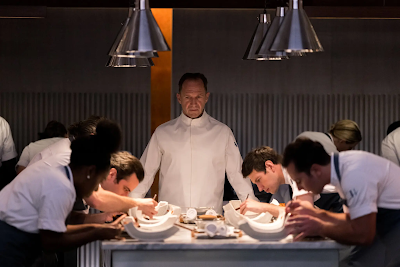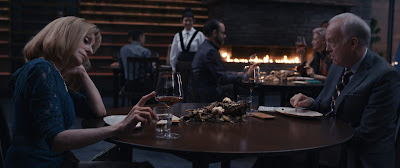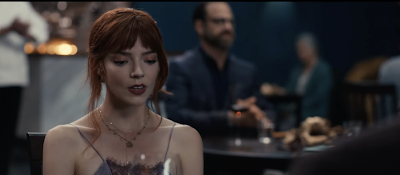The billionaire class really ought to pay closer attention to what's bubbling through the collective unconscious of the current era. The horror movies of this decade, if not this entire century, have been sending them warnings that have gone unheeded. Horror movies are a canary in a coal mine, a good barometer of where the stress points on broader society lie. The moneyed class definitely should be alarmed that you never, ever, see a "good" billionaire in a horror movie. And if there's a tech-bro Steve Jobs-type dude in one? I can almost guarantee you that he'll be monster chum in short order. You can't buy yourself out of the horrors, movies are saying, especially the ones you've created yourself. There's a scene in The Menu (2022, directed by Mark Mylod) that is explicit on this point, when the corrupt billionaire who has financed the exclusive restaurant run by insane chef Julian Slowik is styled as an angel and lowered helplessly into the ocean where he then drowns. The obvious symbolism is that there are no good billionaires. Only a shade less obvious is the idea that billionaires as a class are fallen angels. I. E. they are devils. I appreciate the layered nuance. Mind you, this film is only a horror movie if you're rich. If you're not, then it's either a satire or a wish-fulfillment fantasy. Or maybe both.
The plot of the film follows Margot Mills, who has been invited by Tyler to an event at Hawthorne, an ultra-high end restaurant. Tyler has just broken up with his girlfriend, who was supposed to have gone with him. He's a hardcore foodie, for whom Hawthorne's chef, Julian Slowik, is a superhero. Hawthorne itself is on an island and the attendees meet at the dock. These include food critic Lillian and her editor, Ted, faded action movie star George and his assistant, regular customers Richard and Anne, and a trio of tech executives who work for the man who backs the restaurant. They are met on the island by Elsa, Hawthorne's maitre'd, who gives them a tour of the island before escorting the party to the dining room. As the courses of the event are brought to the table, it becomes clearer and clearer that Slowik is barking mad, a fact confirmed when one of Slowik's sous chefs presents a dish called "The Mess" and puts a gun in his mouth and pulls the trigger. The guests refuse to believe their danger, assuming that it's all theater. Margot believes differently, and when she rises to go to the ladies room, Slowick confronts her. She's not part of the menu. She isn't "supposed" to be there. Slowik can spot a "service worker" a mile away. Worse still, she's a substitute and Slowik categorically states that there are no substitutes at Hawthorne. As the night's menu unfolds, the subsequent dishes edge the diners and the restaurant staff toward their inevitable demise, something Margot wants no part of. The endgame becomes a battle of wits between Slowik and Margot, who has secrets of her own...
The Menu is a clever art film that has been disguised and smuggled into the multiplexes as a horror movie. It has a familial resemblance to other recent horror movies that have done the same thing. The end of the film bears a striking similarity to the end of Midsommar, for one example, while the trope of a working class woman having to outwit a bunch of insane aristocrats is reminiscent of both The Invitation and Ready or Not. But none of these films are The Menu's true ancestor. That film is Luis Bunuel's The Exterminating Angel and its secret sharer, The Discreet Charm of the Bourgeoisie, both of which trap a pack of degenerate rich people at dinner and watch them tear each other to pieces. If the allusion is entirely accidental, then the course of appetizer in which the assembled twits are offered "no bread" because it's a peasant food is an uncanny coincidence given Luis Bunuel's infamous documentary, Land without Bread. I'm pretty sure the filmmakers are aware of their film's provenance, though. It's very precise in its symbols.
This is a sly satire of contemporary food culture, with each successive dish trending more and more ridiculous. Its target audience, in the traditions of snobs throughout history, is too afraid to speak up lest they be thought a barbarian. The worst of them all is Tyler, played with a twitchy highbrow dudebro desire to explain things to his lowbrow uneducated date by Nicolas Hoult, who is in on the joke and aspires to survive by joining the winning team. His menu item is titled "Tyler's Bullshit," which is one of the best jabs at wanna-be artists I've ever seen. The artists come off best. There's a vein of self-hatred running through the menu concocted by Slowick's team that manifests itself as self-destruction in the quest to wow an audience. Exaggerated for effect, true, but on the money otherwise. This is what capitalism has done to art. It has taken the joy of creation away from the artist and created art that is empty posturing. It reminds me of an old Playboy cartoon in which an artist points a gun at his head with the intent of splattering his brains all over a canvas only to have his wife deadpan "It's been done." It also reminds me of that old Warner Brothers cartoon in which Daffy Duck swallows a bunch of explosives and follows it up with a match in order to get a round of applause from an audience. That's the impulse of Slowik's cult of underlings.
Back in December when I first saw this film, I followed it with a showing of Violent Night, in which John Leguizamo plays the Christmas-hating villain. I hadn't intended to see a Leguizamo double feature, but this one was particularly apt. In The Menu, he plays a washed up action movie star who is invited to the island because one of his lesser films offended Slowick with its mediocrity on a particularly bad day. I like to think that Violent Night is the film that Leguizamo's character made immediately before heading for Slowik's event. This is entirely outside the intentions of the filmmakers, but it was a perfect bit of synchronicity. I can imagine the lives of every character in the film outside the arbitrary time-frame of its running time. They aren't deep characters--oh, no. Their main functions are allegorical, else they are there to take up space in the film frame. The casting of the film exceeds their functions, though, and every character has some twitch, some prejudice, some lack of grace that suggests real people. This makes the satire bite harder. Janet McTeer's food critic is a smoker, which the movie is at pains to point out destroys the palate. Thus, she's a hypocrite. Reed Birney's Richard recognizes Margot because he engaged her services at some point. Thus, he's an adulterer. Tyler, an addition to Nicolas Hoult's growing catalogue of twits, knows everyone is going to die, but brings Margot with him anyway. Thus, he's an obsessive and a glutton, pursuing food experiences at all costs. And he's a poseur. All of this is in the background, though, because this is a two-hander at heart between Anya Taylor-Joy and Ralph Fiennes, who test themselves against each other. That's where the heart of the drama lies, between two professionals of a kind who are both tired of the personal degradation their clientele demand. Both want to walk away, but on very different terms. That's where the essential conflict lies, and it's the inflection point from which all of the film's thematic concerns derive. Both performances burnish the actors' resumes, but still serve the film. It's the best kind of star turn for them both.
Margot is the audience surrogate, significantly described by Slowik as "a service provider." She is not the target of Slowik's rage and he regrets catching her in the by-blow. He gives her a choice: die as one of the rich twits or die as one of the oppressed artists. She navigates the film looking for a third option. She finds it appropriately with food. She's having none of the chef's bullshit. She recognizes art made with hate and challenges him to make something with actual love. Her choice is a vulgarian choice, a dish no one at the event would ever choose, but which a film audience of similar salt of the earth responds to with a knowing nod of the head. Margot, significantly, is the only guest on the island who seems to grasp the story Slowik is telling, and who trusts her own palate rather than the performance and hype. There's an old saying that the secret to success is sincerity and once you can fake that, you have it made. Margot would probably disagree. She can smell bullshit just fine while everyone around her swallows it whole. This is a valuable skill when confronting everything about the rich technocrats and grifters who are shaping our society. The three tech bros are significant here. They are almost too on the nose for a movie that is generally more subtle, but they're the key to the film. This movie is about a lot more than food. The kind of food that Slowik is conjuring for these people might be crypto currency or some vaporous venture capital scheme. Slowik isn't necessarily someone like Elizabeth Holmes or Sam Bankman-Fried--the movie demonstrates that he absolutely knows what he's doing for one thing--rather he is someone who is disgusted by the kinds of people who sink money into thin air. So he provides a more rarefied kind of opportunity to show them exactly where the rich are leading us all. It's not for nothing that Slowik's lesson for these people burns the workers as well as the overlords. That's kind of the point.

This blog is supported on Patreon by wonderful subscribers. If you like what I do, please consider pledging your own support. It means the world to me.






















1 comment:
This is the best take on this film that I've encountered so far...
Post a Comment